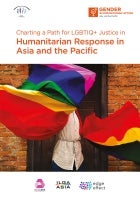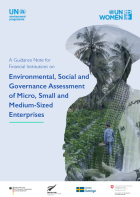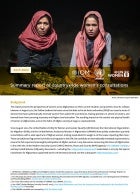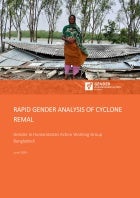Date:
Discover how UN Women drives change through targeted interventions and partnerships that provide Afghan women with the tools and resources they need to thrive.
Date:
This framework ensures that all efforts are aligned and focused on achieving sustainable change, helping to realize the vision of preventing and eliminating GBV in the country.
Date:
This Gender-Impact Flash Update focuses on the gendered response to the flooding and draws on the experiences and insights from local organisations on the ground that are assessing and addressing the gender-specific needs emerging from this crisis.
Date:
The project, aims to develop scalable interventions that can contribute to implementation of key policies in Indonesia that are relevant to the prevention of violent extremism, disaster risk reduction and resilience-building, and the protection and empowerment of women and children.
Date:
The ‘Gender Strategy of the National Police of Timor-Leste (2024-2028)’ was jointly developed by the National Police of Timor-Leste, with technical support from UN Women and generous support from the Government of the United Kingdom, the Government of Canada and the Government of the Republic of Korea under the UN Women ASEAN programme Empowering Women for Sustainable Peace: Preventing Violence and Promoting Social Cohesion.
Date:
The North and Southeastern flood has been unprecedented in its nature, severity, and timing affecting 11 districts in August 2024. It claimed 59 lives and affected 5.8 million people. In the affected areas, 3.05 million women and 78,362 pregnant women are most vulnerable.
Date:
As in other regions, LGBTIQ+ communities in Asia and the Pacific are vulnerable to various forms of discrimination and violence, which are both similar to and distinct from other individuals and groups in humanitarian emergencies. These vulnerabilities stem from pre-existing inequalities, discrimination, and violence that are frequently exacerbated during crises, and are shaped by multiple intersecting factors.
Date:
The OGR, developed in Myanmar by the Gender in Humanitarian Action Working Group (co-led by UN Women and UNFPA) and in partnership with CARE, adapts CARE's Rapid Gender Analysis (RGA) toolkit to the challenges of collecting data in crisis settings.s
Date:
Drawing from the Inter-Agency Standing Committee (IASC) Gender in Humanitarian Action Handbook (https://www.gihahandbook.org) and incorporating insights from the Myanmar Gender in Humanitarian Action Profile, these localized checklists offer practical, sector-specific guidance.
Date:
As part of the “EmPower: Women for Climate- Resilient Societies Programme Phase II (2023-2027)”, the United Nations Environment Programme (UNEP) and the United Nations Entity on Gender Equality and the Empowerment of Women (UN Women) are partnering with regional and/or local financial institutions in target countries (Bangladesh, Cambodia, Indonesia, Philippines and Viet Nam).
Date:
The resulting impact on the mental and physical health of women in Afghanistan, and the fabric of Afghan society at large, is unprecedented.
Date:
The semi-annual UN Women Bangladesh Newsletter: January-June 2024 reflects on the key highlights and major updates of UN Women Bangladesh’s interventions to advance gender equality and women empowerment in the country.
Date:
Key insights highlight how disasters amplify gender-based violence, and livelihood challenges, and hinder access to essential services. The document advocates for GEDSI-responsive planning, budgeting, and coordination within DRR frameworks, stressing the importance of inclusive approaches, stakeholder engagement, and robust monitoring for effective implementation.
Date:
This brief is developed to guide the development of injects for gender-responsive services/interventions for earthquakes and urban flood preparedness, describing disaster events, their impacts and response through a GESI perspective.
Date:
This policy brief addresses some of the key factors and measures to be adopted in a Post-Crisis GESI Analysis, to effectively address a crisis’s differential impacts on gender, social disability, and age. The recommendations are intended to support analyses undertaken immediately after a crisis, to represent structural inequalities...
Date:
The Policy Brief draws from GEDSI Analysis conducted in Lumbini, Sudurpashchim and Karnali Provinces to identify opportunities for municipal governments and development partners to strengthen disaster risk reduction efforts and urban resilience by more comprehensively meeting the needs of women and excluded groups.
Date:
This toolkit—developed by the Women’s Refugee Commission (WRC) with UN Women—is a comprehensive resource to enhance the capacity of frontline humanitarian workers to integrate protection and support for adolescent boys and male youth (ABMY), including persons with diverse sexual orientation, gender identity, gender expression, and sex characteristics (SOGIESC), into protection programs.
Date:
This RGA focuses on seven key areas: 1) Emergency Shelter; 2) Cyclone-Induced Housing Disruptions 3) Food and Income; 4) Safety and Security of Women and Girls; 5) Access to Reproductive Health Services; 6) Access to Water, Sanitation and Hygiene Facilities; and 7) Role of Women-Led Organizations/Women Rights Organizations.
Date:
Based on quarterly consultations in January 2024, a preliminary snapshot of 75 submissions ahead of policy discussions, and statistical modelling undertaken based on figures from the UN Sustainable Development Goals database, this two-page brief summarizes the issue, what Afghan women are saying, why it matters, and what Afghan women want the international community to do.
Date:
This Brief provides a comprehensive situation analysis of gender equality in Bangladesh, offering a snapshot of the nation's advancements in key areas including governance; women, peace, and security; ending violence against women; economic empowerment; climate change and disaster risk reduction, and humanitarian response.

![[cover]](/sites/default/files/styles/search_image_140px/public/2025-02/af-c1472-wee-unw-aco-2pg-brochure-960px.jpg?itok=aFpKq3rw)
![[cover]](/sites/default/files/styles/search_image_140px/public/2025-01/ws-c1438-english-pola-puipui-cover-960px.jpg?itok=PRIMSmmE)
![[cover]](/sites/default/files/styles/search_image_140px/public/2024-11/mn-c1269-giha-gender-impact-flood-update-no-2_nov-2024-960px.jpg?itok=-rSlqKRx)

![[cover]](/sites/default/files/styles/search_image_140px/public/2024-11/gender_strategy_english_draft-960px.jpg?itok=LQ1B-nZ3)
![[cover]](/sites/default/files/styles/search_image_140px/public/2024-09/bd-c1155-rga-north-and-eastern-floods-2024-giha-960px.jpg?itok=RyA265O-)

![[cover]](/sites/default/files/styles/search_image_140px/public/2024-09/mn-c1109-myanmar-observational-gender-review-toolkit-675px.jpg?itok=rGY8hvvq)
![[cover]](/sites/default/files/styles/search_image_140px/public/2024-09/mn-c1108-myanmar-giha-toolkit-2024-960px.jpg?itok=jLDIhy0h)


![[cover]](/sites/default/files/styles/search_image_140px/public/2024-07/bd-c1022-unwomen-newsletter_jan-june2024-960px.jpg?itok=MYFpJPPV)
![[cover]](/sites/default/files/styles/search_image_140px/public/2024-06/np-c949-05-gender-equality-disability-and-social-960px.jpg?itok=h06PBdVx)
![[cover]](/sites/default/files/styles/search_image_140px/public/2024-06/np-c948-04-gender-responsive-costing-for-earthquakes-960px.jpg?itok=mc9kJWZC)
![[cover]](/sites/default/files/styles/search_image_140px/public/2024-06/np-c947-03-unwomen-policy-brief-gedsi-post-crisis-202-960px.jpg?itok=G_7Qks6P)
![[cover]](/sites/default/files/styles/search_image_140px/public/2024-06/bd-c945-1-policy-brief-gedsi-linking-drrm-20-en-960px.jpg?itok=kTtTG-oO)
![[cover]](/sites/default/files/styles/search_image_140px/public/2024-06/hq-cx-at-risk-of-sexual-exploitation-en-960px.jpg?itok=YBrY3TwO)

![[cover]](/sites/default/files/styles/search_image_140px/public/2024-05/af-cx-unwomenxdoha-brief_feb2024-960px.jpg?itok=nT_u0ZPw)
![[cover]](/sites/default/files/styles/search_image_140px/public/2024-04/bd-c836-gender-equality-brief_bangladesh_2024-960px.jpg?itok=vYgIqoCz)